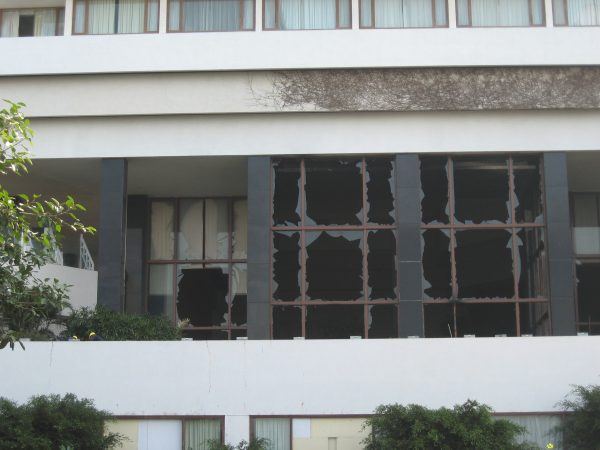Pakistan released Hafiz Saeed, the cleric with a $10 million bounty on his head, from house arrest today. Both India and the U.S. have accused him of masterminding the 2008 Mumbai attacks by Lashkar-eTaiba, an Islamic militant organization in Pakistan. Saeed is the founder of Lashkar-e-Taiba (LeT), which means Army of the Good, or Soldiers of the Pure. Pakistan says there is no evidence linking him to terrorist activities, and no good reason to restrict his activities.
Hafiz Saeed, Terrorist or Philanthropist?
Saeed describes himself as the head of a charitable organization, and denies any involvement in terrorist activity. When the U.S. declared LeT a terrorist organization after the 9-11 attacks, Saeed founded a new organization called Jamaat ul Dawa (JUD), or Group of the Call to Action. JUD claims to be the charitable arm of LeT, and openly raises money and support from Pakistani citizens. The U.S. and India say that JUD is nothing more than a name change from LeT, and that Saeed still manages a terrorist organization.
The U.S. and India say that Saeed still manages a terrorist organization.
Saeed’s LeT used to raise money openly in Pakistan, before 9-11. Mosques and shops all over the country collected money for its campaign to drive Indian forces out of Kashmir. It had a good relationship with the government and security forces, because it did not involve itself in Pakistan’s internal sectarian strife. It was focused solely on the fight for Kashmir, which was considered an unalloyed patriotic good by most Pakistanis.
2008 Mumbai Attacks
In 2001, however, LeT was accused of attacking the Indian parliament, killing twelve people. Pakistan put Saeed under house arrest for three months following that attack, for damaging international relations, but he was released without prosecution. He has been arrested several times, but each time is only put under house arrest and then released after a few months. Critics of Pakistan say the government tolerates his militant activities because it approves of his goals.
160 people were killed, including 28 citizens of 10 foreign countries. Many showed signs of torture.
In 2008, 10 gunmen from Lashkar-e-Taiba conducted a series of military-style attacks against twelve civilian targets in Mumbai, India. The attacks lasted four days, and hit the Taj Palace and Tower Hotel, the Nariman House Jewish cultural center, a café, a hospital, and other soft targets. 160 people were killed, including 28 citizens of 10 foreign countries. Many of those killed showed signs of torture. The government of Pakistan admitted that “a part” of the planning for the operation took place in Pakistan.

The U.S. government requested Saeed’s extradition, but the government of Pakistan refused. They said there was no clear evidence linking Saeed to the attacks. In response, the U.S. government offered a a bounty of $10 million to anyone who could deliver Saeed to U.S. custody.
Saeed told the BBC in a 2014 interview, “I had nothing to do with the Mumbai attacks, and Pakistan’s courts said all India’s evidence against me was just propaganda…. The people of Pakistan know me and they love me. No-one has tried to approach the American authorities to get this bounty. My role is very clear, and God is protecting me.”
The Trump Effect
In early 2017 President Trump gave clear indications of his intention to punish countries that support terrorism or offer safe haven to terrorists. Pakistan’s government put Saeed under house arrest again at that time, a move that was seen as a reaction to Trump’s hard line. Once again, however, the house arrest has proven to last only a few months, and Saeed has been freed.
Hafiz Saeed gave a brief statement upon his release yesterday. In a video released by his organization, he said, “India has always levelled allegations of terrorism … but (Lahore) High Court decision has proved that all of India’s propaganda are false.”
Pakistan’s decision to release Hafiz Saeed is a slap in the face to the families of all the victims of the Mumbai attacks, the attack on the Indian parliament, and all the other attacks carried out by Lashkar-e-Taiba over the past 25 years. It is also a sly challenge to President Trump and the American government. Pakistan may be hoping that the Administration is distracted by other crises in the world. It may also hope that the U.S. will ignore this matter in favor of other priorities. The families of the victims must be hoping that someone will find a way to bring Saeed to American justice, and claim that $10 million reward.
















